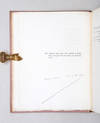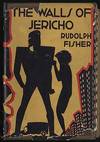

Dialogi de prescientia Dei et predestinatione electorum.
by Joachim, of Fiore, approximately 1132-1202
- Used
- Paperback
- Condition
- See description
- Seller
-
Charlestown, Massachusetts, United States
Payment Methods Accepted
About This Item
Catholic Church jfdp Joachim, of Fiore, approximately 1132-1202. Dialogi de prescientia Dei et predestinatione electorum. Edidit Gian Luca Potesta. (Series: Fonti per la storia dell'Italia medieval). Rome: Istituto storico italiano per il Medio Evo, Roma, 1995, xiv, 158 pages, indices. Paperbound. Pages still uncut although a few were carelessly and partially uncut. Fine copy of a pretty uncommon book. Latin text, introduction in Italian. $42.50 Box 4118
Joachim of Fiore, also known as Joachim of Flora and in Italian Gioacchino da Fiore (c. 1135 – 30 March 1202), was an Italian Christian theologian, Catholic abbot, and the founder of the monastic order of San Giovanni in Fiore. According to theologian Bernard McGinn, "Joachim of Fiore is the most important apocalyptic thinker of the whole medieval period." Later followers, inspired by his works in Christian eschatology and historicist theories, are called Joachimites.
Joachim's theories were refuted by Thomas Aquinas in his Summa Theologica (written 1265-1274). In contrast, Dante Alighieri situated Joachim in the Paradiso of his Divine Comedy (composed c. 1320). Among the Spirituals, the stricter branch of the Franciscans, a Joachite group arose, many of whom saw Antichrist already in the world in the person of Frederick II, Holy Roman Emperor (who died in 1250).
The Fourth Council of the Lateran, in 1215, condemned some of his ideas about the nature of the Trinity. In 1263, the archbishop Fiorenzo enhanced the condemnation of his writings and those of his follower Gerardo of Borgo San Donnino, joining a commission in the Synod of Arles, in which Joachim's theories were declared heretical. The accusation was of having an unorthodox view of the Holy Trinity.
His views also inspired several subsequent movements: the Amalricians, the Dulcinians and the Brethren of the Free Spirit. All of these were eventually declared heretical by the Catholic Church. Joachimite interpretations became popular in the Protestant reformation, and even influenced some Protestant interpretations. Joachim also possibly influenced Dante.
Of importance is the fact that Joachim himself was never condemned as a heretic by the Church; rather, the ideas and movement surrounding him were condemned. Joachim the man was held in high regard during his lifetime.
Reviews
(Log in or Create an Account first!)
Details
- Bookseller
- Focloir
(US)
- Bookseller's Inventory #
- Catholic Church jfdp
- Title
- Dialogi de prescientia Dei et predestinatione electorum.
- Author
- Joachim, of Fiore, approximately 1132-1202
- Format/Binding
- Very good
- Book Condition
- Used
- Quantity Available
- 1
- Binding
- Paperback
- Publisher
- Istituto storico italiano per il Medio Evo, Roma,
- Place of Publication
- Rome:
- Date Published
- 1995
- Pages
- xiv, 158
- Weight
- 0.00 lbs
- Keywords
- Catholic Church, Middle Ages,Italy
- Bookseller catalogs
- History of religion; Middle Ages; Theology; Italian History and Literature; Catholic Church;
Terms of Sale
Focloir
About the Seller
Glossary
Some terminology that may be used in this description includes:
- Fine
- A book in fine condition exhibits no flaws. A fine condition book closely approaches As New condition, but may lack the...

